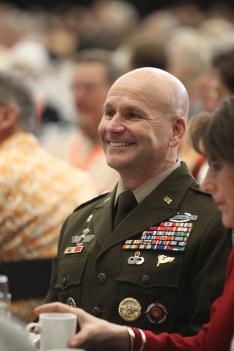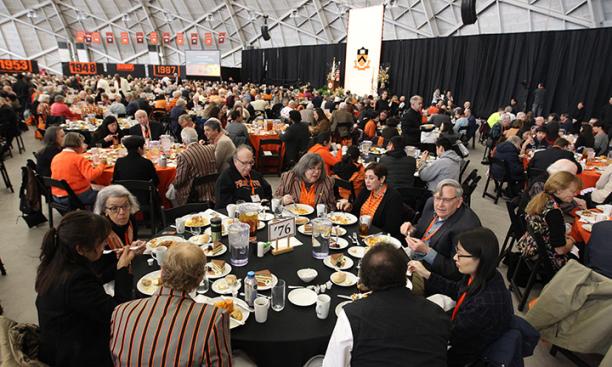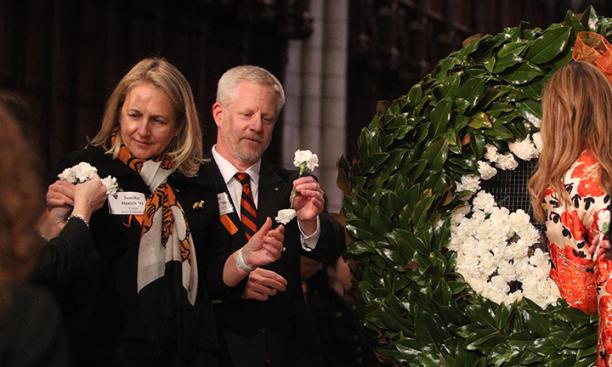


Woodrow Wilson Award winner Gen. Christopher Cavoli ’87 is commander of U.S. European Command and NATO’s supreme allied commander in Europe — pivotal roles in America’s military as the world closely watches the war between Ukraine and Russia. But even Cavoli was overwhelmed by the list of previous recipients of the award he was about to receive on Alumni Day Feb. 25 — and the presence of this year’s other top alumni honoree, James Madison Medalist Robert Kahn *64.
“Most of us have the experience at some point in time or another where Princeton humbled you a little bit,” Cavoli told the full house of alumni, faculty, staff, and guests gathered in Richardson Auditorium for Alumni Day. “You arrived, you thought you were pretty good at things, and then you just ran into so many people who were so accomplished. I cannot believe that I am sharing the stage with the guy who invented the internet.”Cavoli, an Army officer for three decades, spoke about his decision to dedicate his life to service, and thanked other Princetonians who have served. What started as a career path he chose for the excitement and adventure turned out to have much greater meaning, he said.
“Somewhere deep in the background someplace way way back in the recesses of my mind there remained a memory, a memory that guided me and I think all of us back here today. It was the memory of a slogan, in the nation’s service,” he said. “It was there the whole time, in the service of our nation and all nations. In the service of others. That’s what we were taught, that’s what we absorbed here.”
Kahn *64, who received his Princeton Ph.D. in electrical engineering, opened the morning lectures at Richardson, reflecting on his career and the challenges he faced. In the 1970s, Kahn co-created the Transmission Control Protocol and the Internet Protocol (TCP/IP), which are fundamental components of the internet. Princeton “played a key role in my journey as it reinforced and greatly expanded my ability to think critically about technology and systems,” Kahn told the audience. “I was fortunately able to apply those skills to architecture and design and development writ large.”
Kahn spoke about his career in public service, while working for the U.S. Defense Advanced Research Projects Agency (DARPA), where he spent 13 years. There he focused on design and implementation of innovation infrastructures for government and military use. Now the chairman, CEO, and president of Corporation for National Research Initiatives, he has continued to work on network applications, Voice Over Internet Protocol (VOIP), advanced information management techniques, and more.
“Let me just say again how much I really appreciate receiving the James Madison Medal from Princeton University,” Kahn said. “I look forward to many more years of productive interactions with the University and its faculty and students, as well as the wider community.”

The day also included the annual Service of Remembrance in the University Chapel, to honor those who have died in the last year, and a handful of campus events including rock climbing and bouldering with Outdoor Action and a celebration of the 50th anniversary of the Third World Center (now the Carl A. Fields Center).

The Pyne Honor Prize, the top award for undergraduates, was awarded to two students:
The Porter Ogden Jacobus Fellowships, which fund the final year of graduate school, were awarded to four students:
The Class of 1997 received the Class of 1926 Trophy for raising $10,851,997 for its 25th reunion. The Harold H. Helm Award for sustained service to Annual Giving went to William F. Landrigan ’76 of Cincinnati, Ohio.